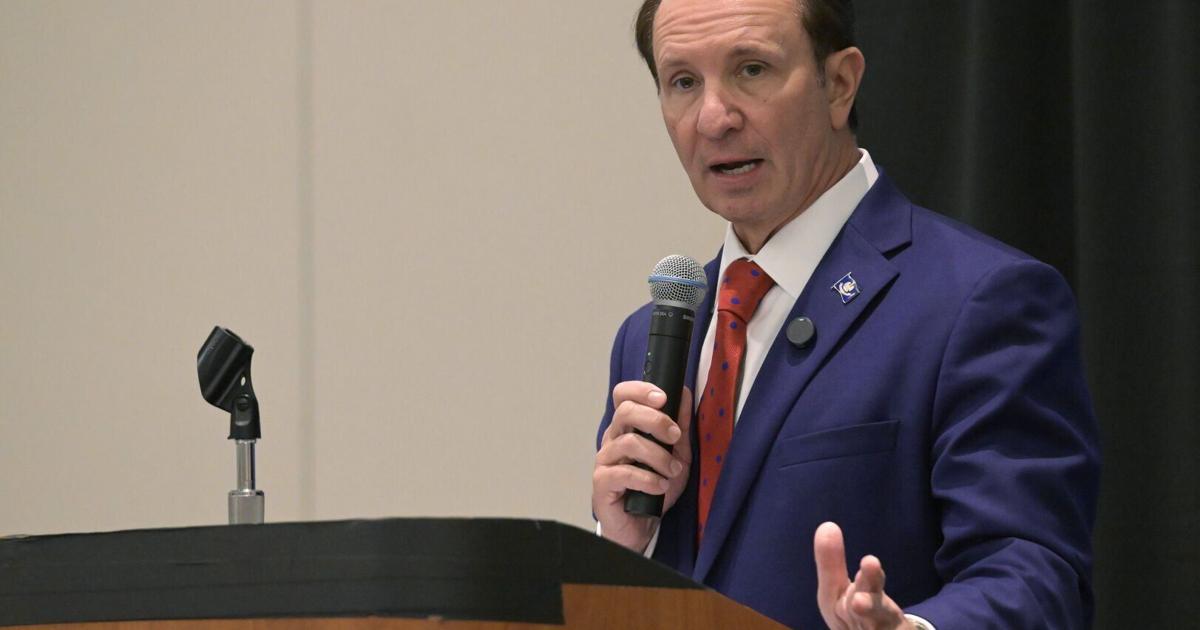Freshmen Republican House members are moving forward with legislation this year that will likely set up a clash with trial lawyers and Gov. Jeff Landry on measures that would make it harder for people injured in car accidents to win big payouts.
Landry angered the freshmen legislators and their allies in the business community last year by killing one major piece of legislation opposed by trial lawyers and watering down several other measures before agreeing to support them.
Landry and the freshmen legislators sought to be on the same page this year by working out a deal at the Governor’s Mansion on March 26 on a package of bills that they all could support, several legislators said. But where that agreement stands is not clear after Landry and five legislative leaders met at a Texas hunting lodge last week with several prominent trial attorneys to discuss car accident legislation.
The trial lawyers there were Gordon McKernan of Baton Rouge, Digger Earles of Lafayette and Todd Townsley of Lake Charles, said the legislators who attended. Also attending was John Condos, a Lake Charles business owner who helps trial lawyers finance their cases, said Senate President Cameron Henry, R-Metairie, who was one of the five legislators flown to and from Texas by McKernan.
Given the uncertainty following that meeting, the freshmen say they will advance their bills during the legislative session that begins Monday.
They had been thinking of holding back two car insurance bills that they know the governor and the trial lawyers oppose – in return for Landry supporting other measures, lawmakers said.
“If the governor is willing to work with us on those bills to get them through, maybe we do hold off on some of the other ideas and give them a year to see how they move the needle,” said Rep. Brian Glorioso, R-Slidell, who is at the center of the negotiations. “You don’t want to go too far and have it backfire and hurt the rights of the legitimately injured.”
The key question is whether Landry still supports House Bill 34 by Glorioso that aims to make it harder for judges and juries to award big medical judgments, something that is anathema to the trial lawyers.
The governor’s office didn’t respond to a request for comment on Glorioso’s bill Tuesday.
Nor did a spokesperson for the Louisiana Association of Justice, which represents the trial lawyers in Baton Rouge.
Landry is holding a press conference Wednesday to announce the insurance measures he will support.
In the meantime, the freshmen said they are determined to pass legislation this year that will end Louisiana’s status as the state with the highest car insurance rates. The trial attorneys lobby, which is one of the most powerful at the Capitol, is likely to oppose several of the measures.
Speaker Pro Tem Mike Johnson, R-Pineville, and Rep. Gabe Firment, R-Pollock, who chairs the House Insurance Committee, said they are supporting the freshmen but declined to comment further.
Rep. Kim Carver, R-Mandeville, said he knocked on 5,000 doors when he won election in 2023.
“The unaffordability of insurance was brought up all the time,” he said, noting that many second- and third-term members didn’t have to campaign because they were elected without opposition. “If there’s frustration among the freshmen, it’s that we’ve done special sessions on other things but not insurance. Now it’s insurance’s time.”
Rep. Chance Henry, R-Crowley, said solving the insurance crisis is uppermost on the minds of his constituents.
“They are more prone to blame the billboards than the insurance companies. They want a solution. That’s what I was sent to Baton Rouge to do,” said Henry, who has co-sponsored several of the bills favored by business interests and insurance companies, with the aim of lowering rates.
At the center of the debate between trial lawyers and business interests is Glorioso’s HB34, which supporters call the “medical transparency bill.”
Glorioso said a flaw in the current legal system prevents lawyers defending businesses and insurance companies from bringing out in court how much the plaintiff actually paid in medical costs. Glorioso said judges and jurors now are only told the billed amount. Glorioso also believes that some lawyers find friendly doctors who produce exorbitant medical bills for plaintiffs.
That in turn leads to excessive payouts for the medical portion in a settlement or jury trial, and that amount is then typically doubled for the pain and suffering portion, said Glorioso, a business lawyer.
His HB34 would allow defendants to put an expert witness on the stand to challenge the doctor’s bill.
“We want to allow defendants to question the amount put out by the plaintiffs,” Glorioso said. “If the medical claims cost is much higher than the actual cost, higher payouts will occur, and that will be reflected in the insurance premium you have to pay. It’s really about fairness.”
Sen. Kirk Talbot, R-River Ridge, presented the business community’s point of view during the trip to Texas.
“Medical transparency doesn’t fix the problem,” Talbot said Tuesday. “It does balance the scales. It allows insurance companies to contest excessive judgements.”
One bill opposed by the trial lawyers is House Bill 435. It would cap the damage award for pain and suffering at $5 million.
“It needs the light of day,” said Rep. Peter Egan, R-Covington, the bill’s sponsor.
Another measure opposed by trial lawyers is House Bill 431 by Rep. Emily Chenevert, R-Baton Rouge.
HB431 would make it harder for big payouts when apportioning blame in an accident where several people are at fault.
